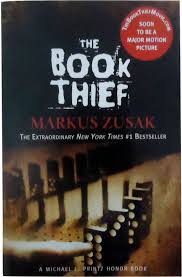Confession time: there is nothing that I love more than a narrator who is not, in fact, the protagonist. While Scout is a very real character in “To Kill a Mockingbird” it is, more than anything, Jeb’s story. And while Nick may be a funny guy in his own right, Daisy and Gatsby are the true protagonists for Fitzgerald. So it is here, in The Book Thief. The narrator is Death himself — the protagonists (for there are three, truly) the characters that he watches live and die.
There are three main characters — Liesel, a young, orphaned girl who serves as the main protagonist; Rudy, the neighbor boy who dreams big; and Max, a Jewish man on the flee from his Nazi persecutors. Each character is simple — Liesel and Rudy are children, with children’s brief histories and overall simplistic views of the world, while Max is forced into simplicity by the situation — he’s trapped in a basement, but his prison is also his salvation.
Liesel is what makes the novel be characterized as young adult — she’s a young girl, spunky an adventerous. She’s smart, clever, but struggles in school — she can play soccer and keep up with the boys, but she’s a voracious reader. She is, in short, the perfect female protagonist for today’s young, female readers. She’s tormented by the memory of her baby brother’s death, by hypothermia or malnutrition, and by being abandoned by her mother. She’s taken in by kindly parents — a boisterous and rowdy adopted mother, a kind accordionist father. She’s a small hero in her own right — kind to the Jews, and trying to save books from burning fires. She befriends lonely old shut-ins, and gives bread to men in the Death March.
Max is the foil to her — he has a lovely history, a successful past, but as Germany falls under Nazi control he is forced into hiding. While Liesel grows up, Max becomes a shadow. He can’t leave lest he be killed, but one can’t live in a basement. Liesel steals books to save them, to learn stories — Max writes stories to escape the world that he lives in. They’re both dreamers.
And then there’s Rudy — the third part of the triangle, and for me, the most interesting character. Unlike Max ans Liesel, Rudy comes from a large family. He’s an athlete, not a scholar, and he’s bright and outgoing, unlike the more subdued Liesel and Max. He’s good-hearted, but a troublemaker, and our narrator, Death, tells us almost immediately that he’s going to die.
Death, then, follows all of the characters closely; Liesel with the death in her past, Max with death in his present, and Rudy with death in the future. Yet, even with death everpresent, each character struggles to live. Rudy dreams of being an Olympic athlete, Liesel dreams of new worlds discovered in her books, and Max dreams up stories to tell his saviors. It’s a story about hope in a very dark time, and it’s a story about how sometimes hope isn’t enough.
The story doesn’t read like a young adult book — the prose is a little too complicated, the subject matter a little too dark. But upon finishing it — the ends neatly tied into bows, each character taken care of, the themes pull together cleanly — that’s when it’s clear that it is meant as something a little younger, a little more hopeful. There are tears in this book, but they are quiet tears — nostalgia more than gut-wrenching pain.
